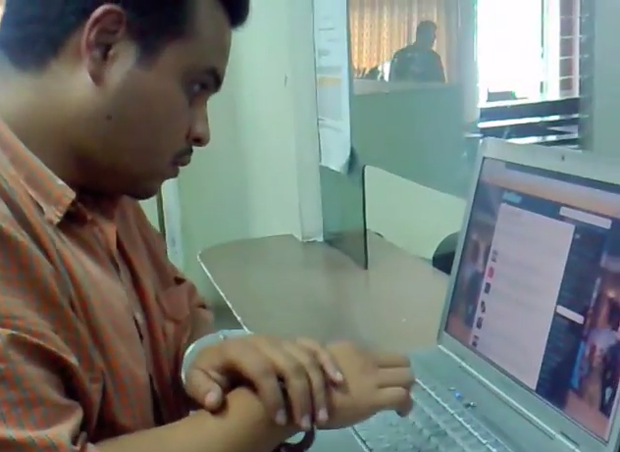9 Jul 2015 | Bahrain, Bahrain Statements, Middle East and North Africa, News

Index on Censorship are taking part in a day of solidarity for imprisoned Bahraini activist Nabeel Rajab on Thursday 9 July. The day was organised by Nabeel’s son Adam, and participants from across the world are sharing videos, photos and messages of encouragement using the hashtag #FreeNabeel.
Rajab is the President of the Index award-winning Bahrain Centre for Human Rights (BCHR) and among the Gulf region’s most well-known human rights activists. Since the Bahraini uprising of 2011, he has been arrested on numerous occasions and had his house tear-gassed for leading protests in which he and others voiced criticism of the Bahraini government.
Having been imprisoned between August 2012 and May 2014, Rajab was once again arrested in October 2014 and charged with “insulting a public institution”. His crime related to tweets in which he alleged that some Bahraini soldiers may have defected to the Islamic State, referring to Bahraini institutions as “ideological incubators”. In May, his six-month prison sentence was upheld.
The solidarity day has been arranged to tie in with a European Parliament vote on an urgent resolution on Bahrain.. The resolution calls for “the dropping of charges and immediate and unconditional release of all human rights defenders, political activists and other individuals detained and charged with alleged violations related to the rights of expression, peaceful assembly and association, including Nabeel Rajab, Sheikh Ali Salman and the ‘Bahrain 13’.” It also calls on the EU to develop a strategy on how they can push for the release of imprisoned activists and prisoners of conscience in Bahrain, and for the ending of exports of tear gas and crowd control equipment to the country.
Bahrain has an appalling human rights record which has worsened since the events of the Arab Spring in 2011. Its penal code of 1976 has been widely criticised as giving widespread powers to the government to suppress dissent, and Reporters Without Borders placed the country on its list of Internet Enemies in 2012 due to its crackdown on online blogging and social media use by activists such as Rajab. The “Bahrain 13”, as they are referred to in the EU resolution, are a group of opposition leaders, activists, bloggers and Shia clerics who were arrested between March and April 2011 for their involvement in the national uprising. Their detainment has drawn criticism from a multitude of countries and organisations who have accused the Bahraini government of torture during trial. The government of Bahrain insists the trials were fair.
UPDATE: The European Parliament on Thursday 9 July adopted the urgency resolution on Bahrain.
You can help put pressure on the Bahraini government to respect and protect freedom of expression. Simply record a video or take a picture of yourself, calling on Bahraini authorities to release Rajab, using the hastag #FreeNabeel.
This article was posted on 9 July 2015 at indexoncensorship.org
3 Jul 2015 | Academic Freedom, Bahrain, Bahrain Statements, Campaigns, mobile
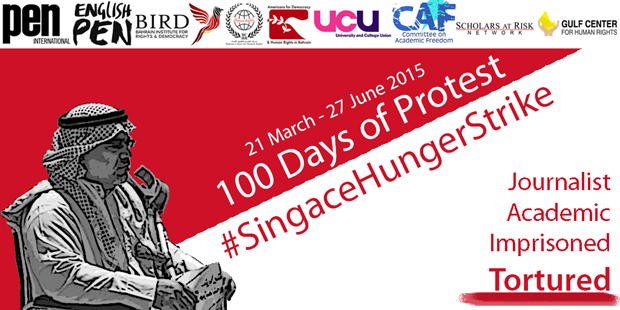
Nine Bahraini and international NGOs and the University College Union launched a campaign this week marking the 100th day of detained human rights defender Dr Abduljalil Al-Singace’s hunger strike.
The Bahrain Institute for Rights and Democracy (BIRD), Americans for Democracy & Human Rights in Bahrain (ADHRB), Bahrain Center for Human Rights (BCHR), Gulf Center for Human Rights (GCHR), English PEN, PEN International, Index on Censorship, Scholars at Risk, Committee on Academic Freedom of the Middle East Studies Association and the University College Union have joined together to express their solidarity with the imprisoned activist.
Dr Al-Singace, a prominent academic and blogger who promoted human rights in Bahrain throughout the 2000s, began a hunger strike on 21 March in protest of the ill-treatment of inmates and the poor, unsanitary conditions at Jaw Prison in Bahrain.
Police arrested Dr Al-Singace for his participation in the peaceful Arab Spring protests in 2011. During his initial detention, security officials subjected Dr Al-Singace to torture and ill-treatment, including forced standing, verbal and sexual assault, beatings, and prolonged solitary confinement. He was tried by a military court in June 2011 and sentenced to life in prison for allegedly plotting to overthrow the government.
Dr Al-Singace suffers from post-polio syndrome, heart, eye, and sinus problems, and requires urgent nasal and ear surgery. Prison authorities have denied Dr Al-Singace specialist medical treatment.
He is detained in solitary confinement at Al-Qalaa Hospital and is not permitted to go outdoors. He is denied access to novels, television, radio, and even pen and paper. He is also not allowed access to religious books and prayer beads, and was not permitted a condolence visit when his nephew died.
We, the aforementioned NGOs, call for the immediate and unconditional release of Dr Abduljalil Al-Singace in addition to all human rights defenders and activists in Bahrain who are detained in violation of Article 19 of the International Covenant on Civil and Political Rights, to which Bahrain is a state party. We demand that Dr Al-Singace receives full access to specialised medical attention as a matter of urgency. We remind Bahrain of its obligations to comply with the UN Standard Minimum Rules for the Treatment of Prisoners. We also call on Bahrain to fully investigate the allegations of ill treatment and torture at Jaw Prison, in line with its obligations under the Convention against Torture.
To express your solidarity with Dr Al-Singace, please take urgent action here:
1. Urge UK MPs to sign an early day motion on Bahrain
2. Sign the petition at English PEN
2. Write a letter via Scholars at Risk call for Action
We also invite you to join our social media campaign and to tweet using the hashtag #SingaceHungerStrike.
17 Jun 2015 | Azerbaijan News, mobile, News
Governments don’t really like coming across as authoritarian. They may do very authoritarian things, like lock up journalists and activists and human rights lawyers and pro democracy campaigners, but they’d rather these people didn’t talk about it. They like to present themselves as nice and human rights-respecting; like free speech and rule of law is something their countries have plenty of. That’s why they’re so keen to stress that when they do lock up journalists and activists and human rights lawyers and pro-democracy campaigners, it’s not because they’re journalists and activists and human rights lawyers and pro-democracy campaigners. No, no: they’re criminals you see, who, by some strange coincidence, all just happen to be journalists and activists and human rights lawyers and pro-democracy campaigners. Just look at the definitely-not-free-speech-related charges they face.
1) Azerbaijan: “incitement to suicide”

Khadija Ismayilova is one of the government critics jailed ahead of the European Games.
Azerbaijani investigative journalist Khadija Ismayilova was arrested in December for inciting suicide in a former colleague — who has since told media he was pressured by authorities into making the accusation. She is now awaiting trial for “tax evasion” and “abuse of power” among other things. These new charges have, incidentally, also been slapped on a number of other Azerbaijani human rights activists in recent months.
2) Belarus: participation in “mass disturbance”
Belorussian journalist Irina Khalip was in 2011 given a two-year suspended sentence for participating in “mass disturbance” in the aftermath of disputed presidential elections that saw Alexander Lukashenko win a fourth term in office.
3) China: “inciting subversion of state power”
Chinese dissident Zhu Yufu in 2012 faced charges of “inciting subversion of state power” over his poem “It’s time” which urged people to defend their freedoms.
4) Angola: “malicious prosecution”
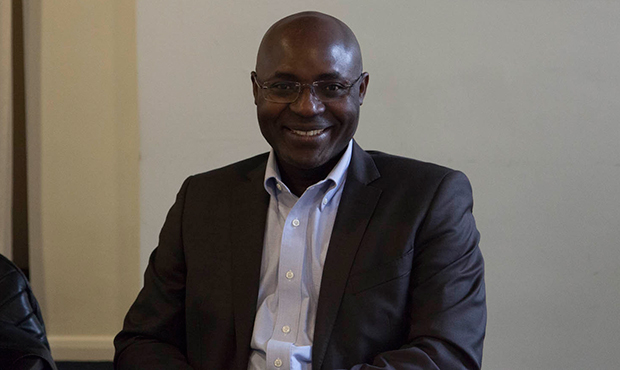
Journalist and human rights activist Rafael Marques de Morais (Photo: Sean Gallagher/Index on Censorship)
Rafael Marques de Morais, an Angolan investigative journalist and campaigner, has for months been locked in a legal battle with a group of generals who he holds the generals morally responsible for human rights abuses he uncovered within the country’s diamond trade. For this they filed a series of libel suits against him. In May, it looked like the parties had come to an agreement whereby the charges would be dismissed, only for the case against Marques to unexpectedly continue — with charges including “malicious prosecution”.
5) Kuwait: “insulting the prince and his powers”
Kuwaiti blogger Lawrence al-Rashidi was in 2012 sentenced to ten years in prison and fined for “insulting the prince and his powers” in poems posted to YouTube. The year before he had been accused of “spreading false news and rumours about the situation in the country” and “calling on tribes to confront the ruling regime, and bring down its transgressions”.
6) Bahrain: “misusing social media

Nabeel Rajab during a protest in London in September (Photo: Milana Knezevic)
In January nine people in Bahrain were arrested for “misusing social media”, a charge punishable by a fine or up to two years in prison. This comes in addition to the imprisonment of Nabeel Rajab, one of country’s leading human rights defenders, in connection to a tweet.
7) Saudi Arabia: “calling upon society to disobey by describing society as masculine” and “using sarcasm while mentioning religious texts and religious scholars”
In late 2014, Saudi women’s rights activist Souad Al-Shammari was arrested during an interrogation over some of her tweets, on charges including “calling upon society to disobey by describing society as masculine” and “using sarcasm while mentioning religious texts and religious scholars”.
8) Guatemala: causing “financial panic”
Jean Anleau was arrested in 2009 for causing “financial panic” by tweeting that Guatemalans should fight corruption by withdrawing their money from banks.
9) Swaziland: “scandalising the judiciary”
Swazi Human rights lawyer Thulani Maseko and journalist and editor Bheki Makhubu in 2014 faced charges of “scandalising the judiciary”. This was based on two articles by Maseko and Makhubu criticising corruption and the lack of impartiality in the country’s judicial system.
10) Uzbekistan: “damaging the country’s image”
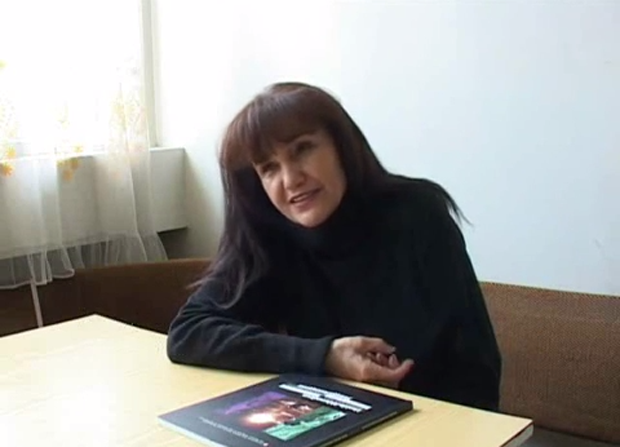
Umida Akhmedova (Image: Uznewsnet/YouTube)
Uzbek photographer Umida Akhmedova, whose work has been published in The New York Times and Wall Street Journal, was in 2009 charged with “damaging the country’s image” over photographs depicting life in rural Uzbekistan.
11) Sudan: “waging war against the state”
Al-Haj Ali Warrag, a leading Sudanese journalist and opposition party member, was in 2010 charged with “waging war against the state”. This came after an opinion piece where he advocated an election boycott.
12) Hong Kong: “nuisance crimes committed in a public place”
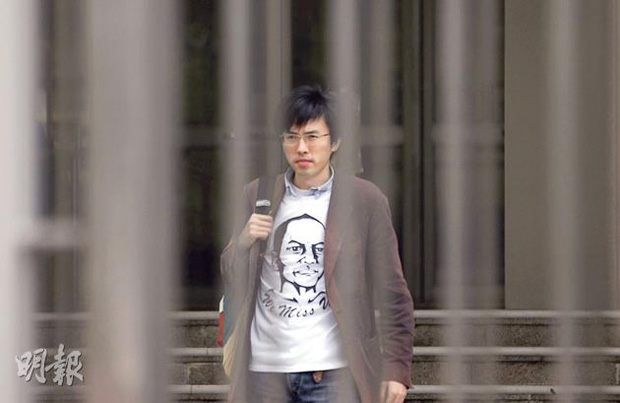
Avery Ng wearing the t-shirt he threw at Hu Jintao. Image from his Facebook page.
Avery Ng, an activist from Hong Kong, was in 2012 charged “with nuisance crimes committed in a public place” after throwing a t-shirt featuring a drawing of the late Chinese dissident Li Wangyang at former Chinese president Hu Jintao during an official visit.
13) Morocco: compromising “the security and integrity of the nation and citizens”
Rachid Nini, a Moroccan newspaper editor, was in 2011 sentenced to a year in prison and a fine for compromising “the security and integrity of the nation and citizens”. A number of his editorials had attempted to expose corruption in the Moroccan government.
This article was originally posted on 17 June 2015 at indexoncensorship.org
28 May 2015 | Bahrain, Middle East and North Africa, mobile, News

Nabeel Rajab during a protest in London in September (Photo: Milana Knezevic)
Nabeel Rajab, one of Bahrain’s leading human rights activists and the president of the Bahrain Center for Human Rights (BCHR), was set to deliver the following speech at the 2015 Oslo Freedom Forum. However, Rajab is currently imprisoned on spurious charges, including some linked to his tweets. Instead, the speech was read out by BCHR Vice President Said Yousif Almahafdah on his behalf.
My name is Nabeel Rajab, and I am writing you from my island country Bahrain, where I am in a prison cell. It was my intention to join you in person today at this exceptional forum and I was looking forward to meeting you human rights advocates and defenders of free expression, thought, and belief. However, I am now behind bars once again.
This is the fifth time that I am being jailed over the past four years. During most of my time in prison I have been completely isolated from the outside world. I am being punished not because I have committed a crime, but because I have defended the human rights of the oppressed and deprived ones, and because I have engaged in exposing the crimes of Bahrain’s rulers and the dictators of the Gulf region.
My people are still living under a repressive regime that rules with an iron fist. A regime that prevents journalists from exposing abuses and rampant corruption; a regime that stifles the voices of intellectuals and advocates of reform and democracy. We, as a nation, are prevented from having ambition, dignity, or even dreams of freedom. Dreams have become crimes in my country of Bahrain, which, on a per capita basis, has more prisoners of conscience than any other country in the world.
I do not want to focus on myself and the suffering that my family and I have gone through, I am just one of the innocent hundreds whose fate is to be behind bars or in exile, simply for speaking or writing about our suffering. Gulf states like Saudi Arabia, are only known for being rich in oil and gas, for possessing the largest arms market in the world and for their wealthy sheikhdoms who hold investments in Western countries. Very few people know or talk about the fact that there are thousands of political detainees and prisoners of conscience in these countries, or that these countries are great violators of human rights.
The reason for the absence of this painful truth is that our authoritarian regimes have profitable economic ties with Western governments. Democracies in the West help whitewash our regimes, in order to obtain a share of their oil wealth. Western politicians choose narrow economic interests over the human rights of millions of oppressed people in the grip of tyranny in Bahrain and beyond.
Dear friends, as you can see we are not just the victims of autocratic regimes, we are also victims of the democratic West, a democratic West that supports and empowers our regimes and equip them with the tools and weapons they need to repress our people.
Regimes like Bahrain are wealthy and very generous in buying the silence of democratic governments and their media outlets in exchange for contracts and investments. The time to say enough with the silence and hypocrisy has come! The time has come to tell Western governments, do not build your interests and luxury on our people’s misery. Please, consider that human rights should be the foundation of any commercial contract or economic interest.
We appreciate the global and Western commitment against militancy, extremism and terrorism, whose greatest ideological, social and financial incubator has been our region. However, we should not ignore the fact that one of the causes that leads to extremism is the absence of human rights, and the deprivation of any space for youth to express their aspiration for freedom, and the suppression of any calls for reform or opposition. Dissent has been crushed to such an extent in Bahrain that the place for our country’s dignitaries and reformers is now prison or exile. We cannot defeat extremism without promoting freedom, having free and open debates, and involving the people in decision-making. If this will not be done, all efforts to combat militant extremism are meaningless.
Dear attendees, you are the most influential people in the world, you are capable of helping us bring to our region the change that we seek. You can make those changes through what you say and what you write, or if you support civil society and human rights groups. Thus, you are in part morally responsible for supporting the human rights movement in my country Bahrain and in the entire Gulf region. I hope you can consider supporting human rights and pro-democracy activists who work day and night in risky and difficult circumstances. We call upon you to pressure Western governments to respect justice and human rights standards — the same human rights standards that you would work for within your borders.
One excellent example of this kind of support is the way the Norwegian government has sponsored this event. I thank the Norwegian government for giving me a platform to speak, as well as for demanding that my government release me. I also thank Norwegian civil society groups and all of the human rights defenders in the audience that, from across the world, are in this same struggle.
I hope to meet you all soon.
This speech was originally published by Bahrain Center for Human Rights.






